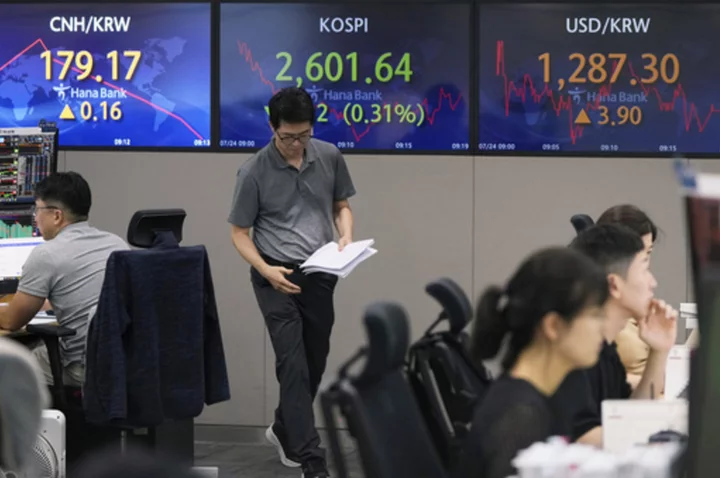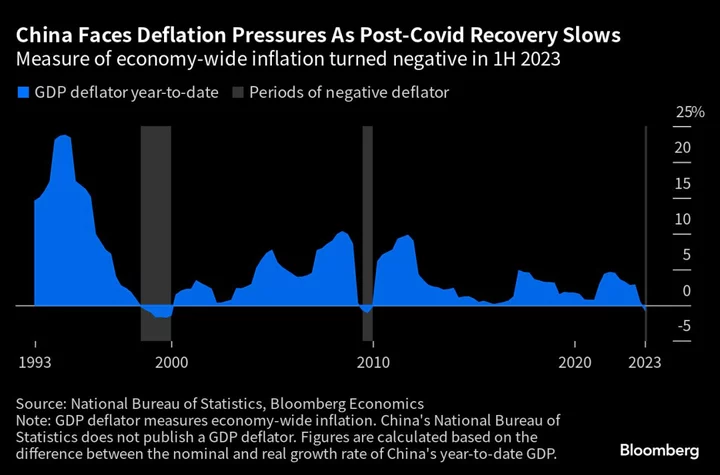BANGKOK (AP) — Asian shares were mixed on Monday, with Hong Kong's benchmark sinking 2.2% following reports suggesting China's leaders do not plan major stimulus measures to prop up slowing growth in the world's second-largest economy.
U.S. futures edged lower and oil prices also fell.
The Federal Reserve is widely expected to raise its federal funds rate on Wednesday to its highest level since 2001. Investors are hoping that might be the final increase of the tightening cycle because inflation has been cooling since last summer. The federal funds rate started 2022 at virtually zero.
A meeting this week of the powerful Politburo of the ruling Communist Party later this week had raised hope for more help for the slowing economy. While reports Monday said that was unlikely, the country's economic planning agency disclosed detailed measures Monday to encourage private investment, the official Xinhua News Agency reported.
The National Development and Reform Commission said it would recommend that private investment be channeled into certain industries with great market potential that match national strategies and industrial policies. That includes sectors like transport, water conservancy, clean energy, new infrastructure, advanced manufacturing, and modern facility agriculture, Xinhua said.
Also this week, the Bank of Japan will hold a policy meeting though it is not expected to yield major changes to the country's ultra-lax monetary stance.
Tokyo's Nikkei 225 index added 1.2% to 32,700.94, while the Hang Seng in Hong Kong dropped more than 400 points to 18,642.40.
The Shanghai Composite index slipped 0.1% to 3,164.16. In Seoul, the Kospi gained 0.7% to 2,628.53. Australia's S&P/ASX 200 shed 0.1% to 7,306.40.
The SET in Bangkok picked up 0.1% and the Sensex in India lost 0.2%.
On Friday, stocks on Wall Street found some stability after sliding the day before.
The earnings reporting season has been gaining momentum, with the majority of companies reporting better results than expected.
The S&P 500 edged up by 0.1%, to 4,536.34, capping its eighth winning week in the last 10. The Dow Jones Industrial Average added less than 0.1% to 35,227.69, its 10th gain in a row. The Nasdaq composite slipped 0.2% to 14,032.81 a day after tumbling to its worst loss in more than four months.
The stock market has generally been on a tear this year, with the benchmark S&P 500 up 18.1%, as the economy has defied predictions for a recession. It's so far powered through much higher interest rates meant to bring down inflation, and the hope is that it may outlast the Federal Reserve's rate-hike campaign.
The Fed is widely expected to raise its federal funds rate on Wednesday to its highest level since 2001. But the hope is that will be the final increase of the cycle because inflation has been cooling since last summer. The federal funds rate started last year at virtually zero.
This week, three of the “Magnificent Seven” companies behind the majority of the S&P 500's gains this year, Alphabet, Facebook parent company Meta Platforms and Microsoft will report their earnings. Expectations are high after they all soared more than 35% so far this year.
The top stocks have become so big and their movements have become so influential over the market that Nasdaq was rebalancing its Nasdaq 100 index before trading was to begin Monday to lessen the impact some stocks have on the overall index.
The seven stocks, which also include Amazon, Apple and Nvidia, are collectively trading with stock prices that are 44 times higher than their earnings per share over the last 12 months, according to Savita Subramanian, equity strategist at Bank of America.
In other trading Monday, U.S. benchmark crude oil slid 37 cents to $76.72 per barrel in electronic trading on the New York Mercantile Exchange. It picked up $1.42 on Friday to $77.07 per barrel.
Brent crude, the pricing basis for international trading, declined 37 cents to $80.70 per barrel.
The dollar fell to 141.39 Japanese yen from 141.68 yen. The euro rose to $1.1146 from $1.1128.









